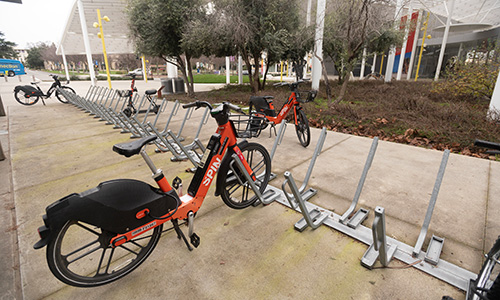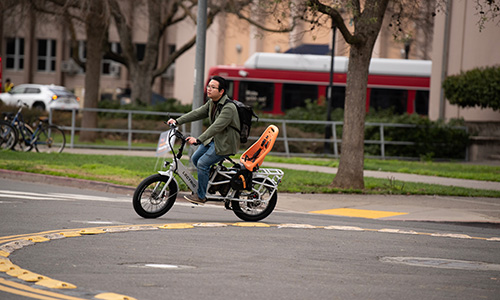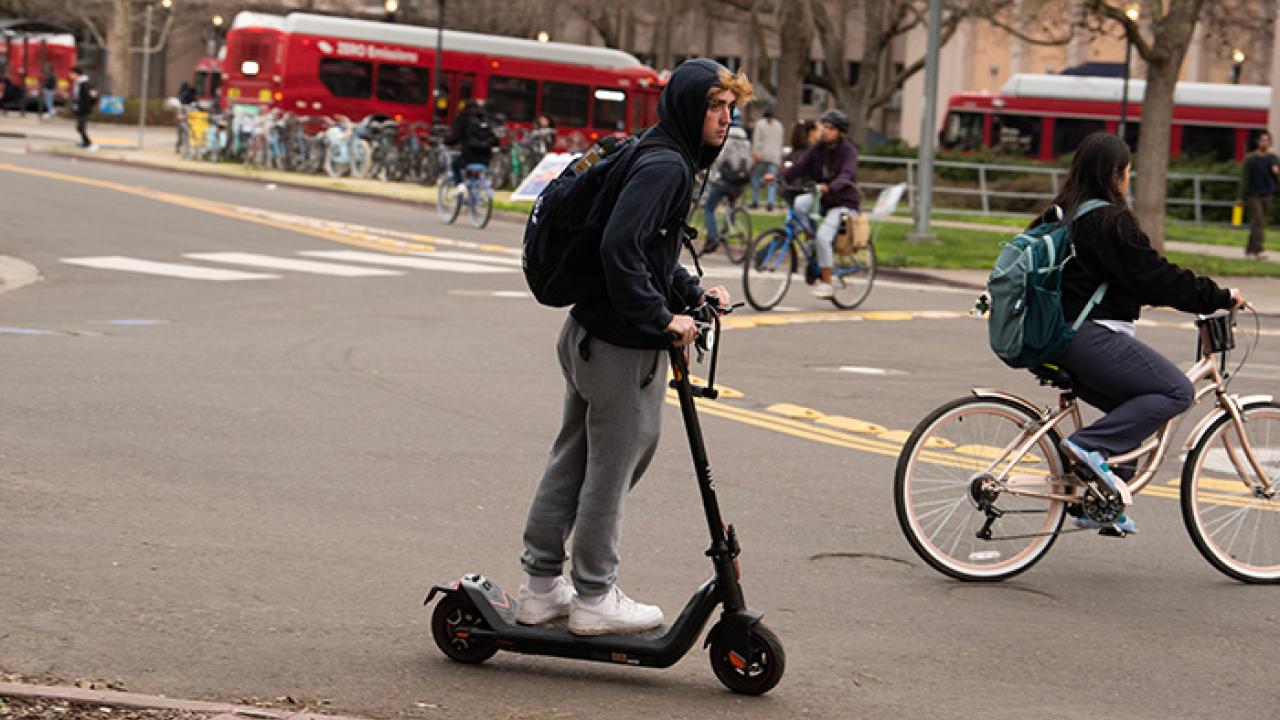Electric bikes and scooters have begun to make their way onto UC Davis bike paths.
Long known for its bike-friendly campus, UC Davis is now home to more electric bikes and scooters than ever before. According to the 2022-23 Campus Travel Survey, on any given day, 1.3% of those who travel to campus rode an e-bike, a slight increase from the previous year.
And while bikes still prevail as the primary mode of transportation, the university has made accessing e-vehicles even easier with SPIN, a shared e-bike and e-scooter program that rolled out this fall. Many students find that the motorized and speedy devices allow them to shorten commute times though UC Davis’ large campus.
UC Davis Bicycle Program Coordinator Jeffrey Bruchez has overseen all things bicycle-related on campus for over four years, and he said he’s noticed the increase in electric mobility options over time.
“Anecdotally, you can see that electric scooters are becoming more ubiquitous,” Bruchez said.
The increase in electric mobility devices has also led to polarization between bike users and electric mobility device users online. Overall, discussions of electric mobility device usage tend to have both adamant proponents and resolute detractors.

The rise of electric mobility
UC Davis paths that were once dominated by traditional bikes are now beginning to be shared with swift electric bikes and scooters. They have become staples for some students as they travel between classes, gatherings and extracurricular activities.
One fourth-year student, who requested to remain anonymous due to backlash she has faced, purchased a foldable electric scooter this past fall. She mentioned that its compact size allows her to bring it with her everywhere, reducing the likelihood of it getting stolen.
“For me, having a bike would mean that I would have to stay on campus 24/7,” she said, adding that her scooter gives her more freedom to travel longer distances.
She recognized the stigma and discourse surrounding electric mobility devices, with some not following traffic rules or disregarding speed limits. However, she said she’s diligent about staying aware of her surroundings and respecting the rules of the road.
“A scooter is fast and it’s small, so I don’t want to risk people not being able to see me. I try to be very aware of myself and everyone else,” she said.
UC Davis SPIN program
In fall 2023, UC Davis rolled out a shared micro-mobility program with San Francisco-based operator SPIN. The company provides shared micromobility in the form of e-bikes and e-scooters, intended to be used for short trips.
“It’s really viable. You can take a bike to go to lunch or to a class that is a little bit too far for walking distance,” Bruchez explained.
UC Davis is also able to control SPIN devices via policy. For example, SPIN vehicles are set to a speed limit of 15 miles per hour, which is UC Davis’ mandated speed limit for electric mobility vehicles. UC Davis can also decide where these vehicles are allowed to operate, preventing them from entering areas with high pedestrian foot traffic.

Electric mobility discourse
The recent increase in electric mobility devices has come with an increase in discourse surrounding them. Various opinions on their usage, both positive and negative, have emerged online.
One UC Davis subreddit poster called e-scooters “the most dorky, useless, and lame mode of transportation,” while another user in the same thread responded with, “I think you’re jealous and wish you had one.”
Noah Sonet, a third-year student at UC Davis, uses his traditional bike to get everywhere in town. He said he prefers it over electric options due to its cheaper price tag on top of its ability to get him where he needs to be.
“I like being able to wait 10 minutes before my class to bike rather than waiting for the bus,” Sonet joked. “Bikes are also cheaper than scooters. I got mine for $50 off of Facebook Marketplace.”
When questioned about electric scooters, Sonet brought up a sentiment shared by many people in the UC Davis subreddit: He’s seen electric vehicles ride too fast.
“The scooters go super fast, like 25 to 30 miles per hour. I actually saw an accident last quarter involving an electric scooter. It had been going really fast, hit something, and the rider just fell on the ground,” Sonet recalled.
Electric mobility vehicle safety
Though e-bikes and scooters are compact and practical, they’ve posed a number of safety concerns, particularly in the realms of speed and fire safety. Their rechargeable lithium-ion batteries are prone to overheating, and speeds on the devices aren’t strictly regulated.
“They’re so much faster and quieter than bikes are,” said a second-year UC Davis pedestrian. “Sometimes I can’t even hear when they’re coming.”
UC Davis has a campus speed limit of 15 miles per hour for bikes and electric mobility devices. With the rise of electric mobility options, Bruchez said he is exploring strategies to get students to register their vehicles. This would provide the bicycle program with information on people’s devices, allowing them to distinguish between vehicles that adhere to standards and those that don’t.
“We’re starting the initial phases of promoting people to register their devices, which would give us more information about the devices and whether or not they’re safe,” Bruchez explained.
Fire safety is also a concern when it comes to electric mobility devices. Bruchez emphasized the importance of safe vehicle charging practices to prevent overheating batteries and fires.
“Only use your manufactured charger and pay attention to third-party certifications,” Bruchez said. “We want to see people getting on these devices, but the key is that we want them to be safe.”
